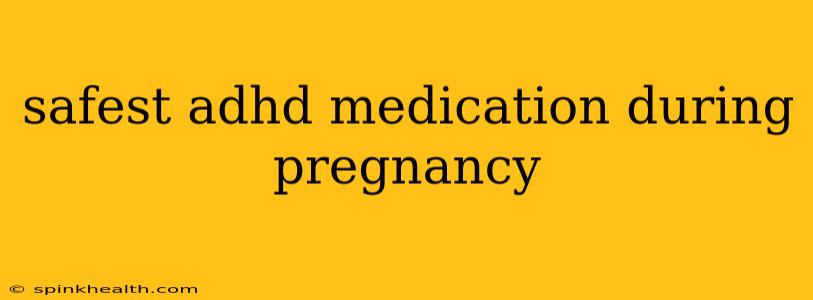The journey of expecting a child is filled with joy, anticipation, and, for many women with ADHD, a crucial decision: how to manage their condition during pregnancy. This is a deeply personal and complex issue, requiring careful consideration of both maternal well-being and fetal development. There's no single "safest" medication, as the ideal approach is highly individualized and depends on numerous factors. This article aims to shed light on this delicate balance, exploring the challenges and considerations involved. Remember, this information is for educational purposes only and should not be considered medical advice. Always consult with your doctor or psychiatrist for personalized guidance.
What are the challenges of managing ADHD during pregnancy?
Untreated ADHD symptoms can significantly impact a woman's ability to manage the demands of pregnancy and motherhood. These challenges can include difficulty concentrating on prenatal care, managing appointments, adhering to healthy routines, and coping with the emotional rollercoaster of pregnancy. Simultaneously, the potential risks associated with medication during pregnancy must be carefully weighed.
What are the risks associated with ADHD medication during pregnancy?
The potential risks associated with ADHD medications during pregnancy vary depending on the specific medication and dosage. Some studies suggest potential links between certain medications and adverse pregnancy outcomes, such as premature birth or low birth weight. However, it's crucial to remember that these are potential risks, not certainties, and the risk of untreated ADHD also needs to be considered. The potential benefits of managing ADHD symptoms need to be carefully weighed against any potential risks.
Is it safe to take any ADHD medication during pregnancy?
There isn't a medication that's universally considered "safe" during pregnancy. The decision of whether or not to continue medication, and which medication to use, is a highly individualized one, made in close collaboration with a healthcare provider. They will consider the severity of your ADHD symptoms, your medical history, and your personal preferences.
What medications are sometimes considered for pregnancy?
While no medication is entirely risk-free, some are considered by some doctors for pregnancy based on available evidence and ongoing research. This frequently involves a careful weighing of the risks and benefits, and is highly dependent on individual circumstances. It is crucial to discuss this with your doctor or psychiatrist and not make any decisions independently.
What are the alternatives to medication for ADHD during pregnancy?
Non-pharmacological approaches can be helpful alongside or instead of medication. These include:
- Therapy: Cognitive Behavioral Therapy (CBT) can be valuable in developing coping mechanisms and strategies to manage ADHD symptoms.
- Lifestyle changes: Prioritizing sleep, regular exercise, a healthy diet, and stress reduction techniques can contribute significantly to symptom management.
- Support groups: Connecting with other women with ADHD who are navigating pregnancy can offer invaluable emotional support and practical advice.
Are there long-term effects on the baby from taking ADHD medication during pregnancy?
Research on the long-term effects of ADHD medication exposure during pregnancy is ongoing and not conclusive. More studies are needed to fully understand the potential long-term impact on the child.
What about breastfeeding and ADHD medication?
Breastfeeding and ADHD medication also require careful consideration. Some medications may pass into breast milk, and your doctor will need to assess the potential risks and benefits for both you and your baby.
When should I talk to my doctor about my ADHD medication and pregnancy?
The earlier you discuss your ADHD medication and pregnancy plans with your doctor, the better. Ideally, this conversation should happen before you conceive. This allows for a collaborative and informed decision-making process.
The information provided in this article is not a substitute for professional medical advice. Always consult with your doctor or psychiatrist to discuss the best course of action for managing your ADHD during pregnancy and beyond. Your doctor is the best resource to help you weigh the risks and benefits and develop a personalized plan tailored to your specific situation. Open communication and close monitoring are essential to ensuring the health and well-being of both you and your baby.

